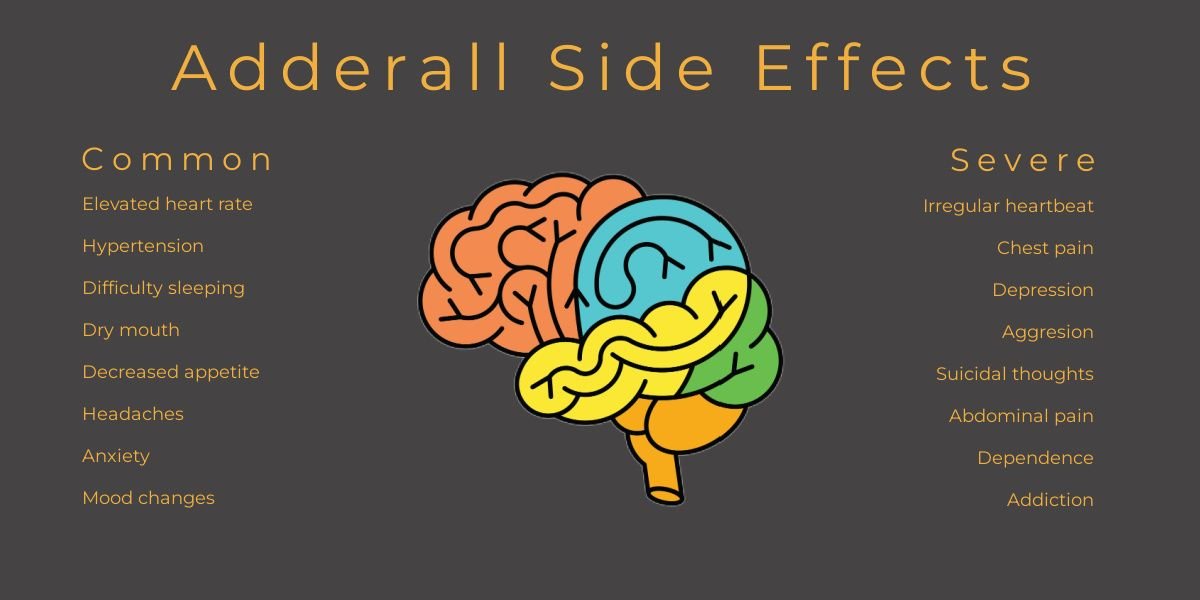Adderall is a brand-name medication often prescribed to treat attention-deficit/hyperactivity disorder (ADHD) and narcolepsy. It is made from a combination of amphetamine and dextroamphetamine. Because of its effects, Adderall carries a risk of misuse and addiction and can cause withdrawal symptoms when the medication is stopped.

Does Adderall cause withdrawal symptoms?
Discontinuing Adderall (amphetamine/dextroamphetamine) use can cause withdrawal symptoms, particularly if the medication is abruptly stopped. As such, a gradual reduction in dosage is recommended, particularly following prolonged use.[1]
Adderall (amphetamine/dextroamphetamine) affects the activity and levels of the neurotransmitters norepinephrine, dopamine, and serotonin. Norepinephrine impacts functions such as energy and cognition. Dopamine is primarily involved in the reward circuit and creates a pleasure response. Serotonin impacts several functions including the regulation of mood, appetite, and sleep.[2]
Adderall (amphetamine/dextroamphetamine) is prescribed to treat ADHD or narcolepsy.[1] However, some people might misuse this medication to increase concentration and reduce fatigue, with the aim of improving academic or athletic performance. Additionally, Adderall (amphetamine/dextroamphetamine) can create a feeling of euphoria or ‘high’, also contributing to its risk of misuse.[3]
Because of these effects, Adderall (amphetamine/dextroamphetamine) is often misused by people who are not prescribed the medication, or taken in higher doses than prescribed. This can lead to a risk of tolerance, dependence, and addiction.[4]
Prolonged use of Adderall (amphetamine/dextroamphetamine) can lead to the development of tolerance. This means that increased or more frequent doses are required to create the desired effect. Increased use can also lead to physical dependence, meaning that the individual must continue to take the medication to prevent unpleasant physical and emotional effects.[5]
If a dependence or addiction to Adderall (amphetamine/dextroamphetamine) forms, stopping the use of this medication suddenly can cause severe withdrawal symptoms.[4]
Adderall withdrawal symptoms
When stopping Adderall (amphetamine/dextroamphetamine) use, it is common to experience withdrawal symptoms. These can range from mild to severe and can vary in their duration.
Common Adderall (amphetamine/dextroamphetamine) withdrawal symptoms include:[1][5][6][7]
- Insomnia and other sleep disturbances
- Oversleeping
- Mood changes
- Low mood
- Anxiety
- Paranoia
- Agitation
- Irritability
- Fatigue
- Impaired concentration
- Increased appetite
- Drug cravings
In some cases, severe withdrawal symptoms can occur, which can include:[5][6][7]
- Extreme mood changes including severe depression and suicidal ideation
- Cardiac issues, such as irregular heartbeat or heart attack
- Psychotic symptoms such as hallucinations and disordered thoughts
- Seizures
- Persistent headaches
Adderall withdrawal timeline
Typically, withdrawal symptoms will begin within several hours of stopping Adderall (amphetamine/dextroamphetamine). Within the first few days, it is common to experience what is known as a ‘crash’. This includes severe changes in mood, sleep, and appetite.[7]
In the days following this, additional withdrawal symptoms can emerge, while severe withdrawal symptoms begin to reduce. For some, withdrawal symptoms can resolve within a week. However, for others, they might persist for several weeks. Commonly, the most persistent withdrawal symptoms include sleep disturbances and mood changes.[5][6]
The severity and duration of withdrawal symptoms experienced by individuals stopping Adderall (amphetamine/dextroamphetamine) use can vary. This will often depend on the duration of use, dosage, use of immediate- or extended-release medication, method of administration, additional substance use, and underlying physical or mental health conditions.[4][7]
Adderall cessation timeline
An appropriate cessation timeline for Adderall (amphetamine/dextroamphetamine) will vary depending on the individual, the duration of use, daily dosage, and the severity of withdrawal symptoms that occur.[7]
For some people, reducing their daily dosage by 50% every 3-4 days may be an appropriate approach to cessation. However, if someone has used high doses for a prolonged period, this may not be appropriate. A slower and more gradual cessation might be required, such as reducing their daily dosage by 5mg every 2-4 weeks.
Throughout cessation, the prescribing doctor will monitor for withdrawal symptoms and adjust the dosage reduction as necessary. Cessation can be paused or slowed if required, while withdrawal symptoms decrease.[1][8]
Adderall detox treatment
Some people may choose to stop using Adderall (amphetamine/dextroamphetamine) suddenly (cold turkey), although this will likely cause severe withdrawal symptoms. Others might prefer to gradually reduce their dosage, to prevent severe withdrawal. With either approach, it is recommended to seek advice and input from a medical professional.[8]
Inpatient or outpatient treatment can be provided by professionals in a hospital or rehabilitation facility. This allows professionals to monitor individuals throughout this process, checking for and managing any withdrawal symptoms, suicidal ideation, and potentially dangerous effects that occur.[5]
There are no medications approved for use in amphetamine withdrawal, although antidepressants might be prescribed to manage symptoms of depression or suicidal ideation. Some people might be prescribed a short-term treatment of antipsychotic medication or benzodiazepines to help manage symptoms such as agitation, irritability, and psychosis.[6][7]
During the initial stages of Adderall detox, individuals are likely to experience changes in sleep and appetite. Improving sleep quality and nutritional intake at this time is important and can help to manage the withdrawal process.[5]
Talk therapies can also be beneficial during and following Adderall (amphetamine/dextroamphetamine) detox, especially for those who experience substance use disorders or underlying mental health conditions. Therapies can help people change addictive behaviors, cope with cravings and triggers in beneficial ways, manage underlying emotional distress and trauma, and improve psychosocial functioning.[4][8]
Individuals with substance use disorders might benefit from ongoing treatments to improve recovery and maintain sobriety. This could include psychotherapy, support groups, medications such as antidepressants, and holistic therapies.[8]


-guide-detail.jpg?v=1756808523)

